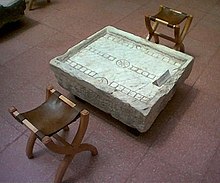Ludus (ancient Rome)


Ludus (plural ludi) in ancient Rome could refer to a primary school, a board game, or a gladiator training school. The various meanings of the Latin word are all within the semantic field of "play, game, sport, training" (see also ludic).[1]
An
The word ludus also referred to a training school for gladiators; see Gladiator: Schools and training. Examples include the Ludus Magnus and Ludus Dacicus.
Ludus was also the word for a board game, examples of which include ludus latrunculorum and ludus duodecim scriptorum, or a game played with knucklebones (astragali).
Latin poetry often explores the concept of ludus as playfulness, both in the writing of poetry as a kind of play and as a field for erotic role-playing.[2] "Poetic play (ludus, ludere, iocum, etc.)," Michèle Lowrie observes, "denotes two related things: stylistic elegance of the Alexandrian variety and erotic poetry."[3]
Ludi, always plural, were the games held in conjunction with Roman religious festivals.
See also
- Lusus Troiae, the Troy Game
References
- ^ Oxford Latin Dictionary (Oxford: Clarendon Press, 1982, 1985 reprint), pp. 1048–1049.
- ^ Thomas N. Habinek, The World of Roman Song: From Ritualized Speech to Social Order (Johns Hopkins University Press, 2005), pp. 5, 143, et passim.
- ^ Michèle Lowrie, Horace's Narrative Odes (Oxford University Press, 1997), p. 41.
